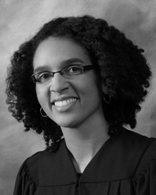Judge on SCOTUS short list faces scrutiny for her stance for US in religious rights case

California Supreme Court Justice Leondra Kruger. Photo from the Judicial Council of California.
California Supreme Court Justice Leondra Kruger, a possible nominee for the U.S. Supreme Court, is facing scrutiny for the position that she took on behalf of the United States in a religious rights case involving a narcoleptic teacher before the Supreme Court.
Kruger argued the case for the Obama administration when she was working in the U.S. solicitor general’s office, the Washington Post reports. She lost 9-0 when the Supreme Court ruled in 2012 that the teacher at a religious school with the title of “minister of religion” could not sue for job bias.
The case was Hosanna-Tabor Evangelical Lutheran Church and School v. EEOC. The high court ruled that the school may decide who teaches its faith under the “ministerial exception” to employment discrimination law, which is grounded in the First Amendment religion clauses.
The solicitor general’s office took an extreme position in the case, according to Michael W. McConnell, a former federal judge who is an expert on religion and director of the Stanford Constitutional Law Center.
McConnell told the Washington Post that the government argued that the Constitution’s religion clauses had only limited impact in cases involving anti-discrimination laws. When Kruger argued the case before the Supreme Court, Kruger’s former boss in the solicitor general’s office, Justice Elena Kagan, said she found it “amazing” that the government was arguing that neither the free exercise clause nor the establishment clause had any special application in the church case.
Carrie Severino, president of the Judicial Crisis Network, a conservative advocacy organization, told the Washington Post that Kruger “was the No. 2 in the SG’s office at the time,” and it “defies common sense to suggest that she would not have been instrumental in the development of the government’s position in this case.”
Kruger became an assistant to the solicitor general in 2007 before Kagan became solicitor general in 2009, a position that Kagan had for a year. Kruger became acting principal deputy solicitor general in 2010 and was working for then-Solicitor General Donald B. Verrilli Jr. when the government brief was filed.
Kruger left the office in 2013 to become a deputy assistant attorney general for the Department of Justice’s Office of Legal Counsel.
Verrilli told the Washington Post and the New York Times that he decided on the government’s position, which he now regrets because it was tone deaf on the issue of religious liberty.
“Hosanna-Tabor was 100% on me,” Verrilli told the Washington Post. “If I had one case to do over as solicitor general, it would be that case.”
But supporters point to Kruger’s grace under pressure during the Hosanna-Tabor oral arguments as a reason why she would make a good justice, according to CNN. As Kruger “parried difficult questions, her voice never rose, her cadence never broke,” according to CNN.
See also:
ABAJournal.com: “Potential Supreme Court nominee Kruger is described as a moderately liberal justice on California’s top court”



